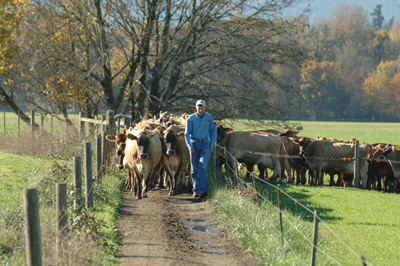
(Lynn Ketchum, OSU EESC)
Organic Livestock Production
The organic livestock standards, which apply to animals used for meat, milk, eggs, and other animal products, specify:
- Animals for slaughter must be raised under organic management from the last third of gestation, or no later than the second day of life for poultry.
- Producers are required to give livestock agricultural feed products that are 100 percent organic, but may also provide allowed vitamin and mineral supplements.
- Organically raised animals may not be given hormones to promote growth, or antibiotics for any reason. Preventive management practices, including the use of vaccines, will be used to keep animals healthy.
- Producers are prohibited from withholding treatment from a sick or injured animal; however, animals treated with a prohibited medication may not be sold as organic.
- All organically raised animals must have access to the outdoors, including access to pasture for ruminants.